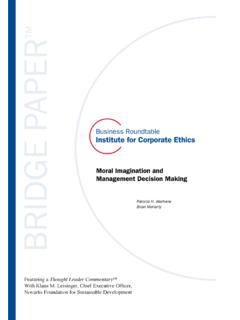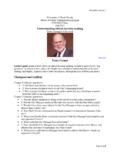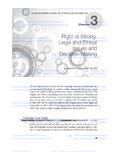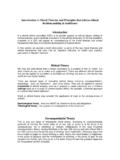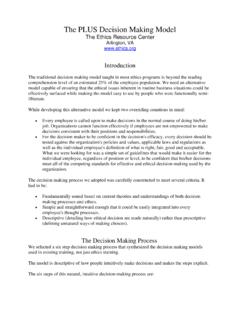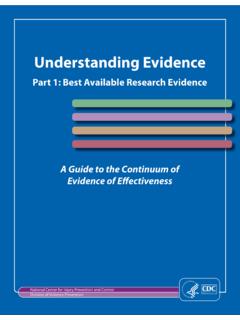Transcription of er P Bridge Pa - Darden School of Business
1 Bridge PaPer Developing ethical LeadershipR. Edward FreemanLisa StewartFeaturing a Thought Leader Commentary with Steve Odland, Chairman and CEO, Office Depot, Inc. 2006, Business Roundtable Institute for Corporate Policy: Bridge Papers may only be displayed or distributed in electronic or print format for non-commercial educational use on a royalty-free basis. Any royalty-free use of Bridge Papers must use the complete document. No partial use or derivative works of Bridge Papers may be made without the prior written consent of the Business Roundtable Institute for Corporate PDF version of this document can be found on the Institute Web site at: PaPers Uniting best thinking with leading Business ..2 What is ethical leadership ..2 Becoming an ethical Leader ..8developing ethical Leaders ..9 Thought Leader Commentary with steve Odland ..10about the authors.
2 132 Business Roundtable Institute for Corporate EthicsForEworDThe Business Roundtable Institute for Corporate Ethics is an independent entity established in partnership with Business Roundtable an association of chief executive officers of leading corporations with a combined workforce of more than 10 million employees and $4 trillion in annual revenues and leading academics from America s best Business schools. The Institute brings together leaders from Business and academia to fulfill its mission to renew and enhance the link between ethical behavior and Business practice through executive education programs, practitioner-focused research and Bridge PapersTM put the best thinking of academic and Business leaders into the hands of practicing managers. Bridge PapersTM convey concepts from leading edge academic research in the field of Business ethics in a format that today s managers can integrate into their daily Business decision making.
3 Developing ethical Leadership1 is an Institute Bridge PaperTM based on the research of R. Edward Freeman. Weaving his research together with learnings he has garnered from conversations with a host of executives and students during the last 25 years, Freeman creates a framework for developing ethical leadership . The accompanying interview with Steve Odland, Chairman and CEO of Office Depot, Inc. provides a CEO perspective on what it means to be an ethical leader in today s Business and social contexts, addressing key topics such as executive compensation and the need to encourage a culture of pushback. what Is ethical leadership ?One typical response to the ethics crisis in Business is a clarion call for more ethical leadership , yet there are few explanations of what exactly is meant by the term. Many executives and Business thinkers believe that ethical leadership is simply a matter of leaders having good character.
4 By having the right values or being a person of strong character, the ethical leader can set the example for others and withstand any temptations that may occur along the way. Without denying the importance of good character and the right values, the reality of ethical leadership is far more complex and the stakes are much higher. Over the past 25 years, in talking to executives in a number of industries about the problems of how to lead in a world of great change globalization, democratization, and incredible tech-nological advances we have identified a number of touchstones for the idea of ethical leadership . Our experience is often contrary to the picture of Business executives one finds in public discussion where they are often seen as greedy, competitive, and only concerned with compensation. In fact most executives want to be effective in their jobs and to leave their companies and the world a better place, creating value on both fronts for those whose lives they see their constituents as not just followers, but rather as stakeholders striving to achieve that same common PAPER : Developing ethical LeadershipOur view of ethical leadership takes into account not only the leader but also his constituents (followers and key stakeholders), the context or situation that the leader and constituents face, the leader s processes and skills, and the outcomes that result.
5 Leaders are first and foremost members of their own organizations and stakeholder groups. As such, their purpose, vision, and values are for the benefit of the entire organization and its key stakeholders. Leaders see their constituents as not just followers, but rather as stakeholders striving to achieve that same common purpose, vision, and values. These follower and stakeholder constituents have their own individuality and autonomy which must be respected to maintain a moral community. ethical leaders embody the purpose, vision, and values of the organization and of the constituents, within an understanding of ethical ideals. They connect the goals of the organization with that of the internal employees and external stakeholders. Leaders work to create an open, two-way conversation, thereby maintaining a charitable understanding of different views, values, and constituents opinions.
6 They are open to others opinions and ideas because they know those ideas make the organization they are leading of ethical LeadersIn today s turbulent world, ethics and values are present at a number of levels for executives and managers leaders who devote their time and energy to leading the process of value creation. This broader concept of ethical leadership empowers leaders to incorporate and be explicit about their own values and ethics. The following list provides a framework for developing ethical leadership . It is based on the observations of and conversations with a host of executives and students over the past 25 years, and on readings of both popular and scholarly Business literature. Written from the perspective of the leader, these ten facets of ethical leaders offer a way to understand ethical leadership that is more complex and more useful than just a matter of good character and values.
7 ethical lEadErs:1. articulate and embody the purpose and values of the organization. It is important for leaders to tell a compelling and morally rich story, but ethical leaders must also embody and live the story. This is a difficult task in today s Business environment where everyone lives in a fishbowl on public display. So many political leaders fail to embody the high-minded stories they tell at election time, and more recently, Business leaders have become the focus of similar criticism through the revelations of numerous scandals and bad behaviors. CEOs in today s corporations are really ethical role models for all of a series of unethical activities by Citigroup employees in Japan in 2004, new CEO Chuck Prince fired several executives, publicly accepted It is important for leaders to tell a compelling and morally rich story, but ethical leaders must also embody and live the story.
8 4 Business Roundtable Institute for Corporate Ethicsresponsibility and bowed apologetically to Japanese Not only did Prince s message resonate within Japan, but it also signaled a new era of shared responsibility within the culture of Citigroup where every employee was expected to take ownership for their decisions that affected the Focus on organizational success rather than on personal ego. ethical leaders understand their place within the larger network of constituents and stakeholders. It is not about the leader as an individual, it is about something bigger the goals and dreams of the organization. ethical leaders also recognize that value is in the success of people in the organization. In 1998, in a bold gesture demon-strating how he valued the company s line employees, Roger Enrico, former Chairman and CEO of PepsiCo, chose to forego all but $1 of his salary, requesting that PepsiCo, in turn, contribute $1 million to a scholarship fund for employees In a similar manner, the founders of JetBlue began a process of matching, from their salaries, employee donations to a charity.
9 Today, their entire salaries go to the JetBlue Crewmember Catastrophic Plan charity, to assist staff with crises not covered by The point of these examples is not that ethical leaders donate their salaries to charities, but rather that ethical leaders identify and act on levers, such as employee loyalty, that drive organizational success. 3. Find the best people and develop them. This task is fairly standard in different models of leadership . ethical leaders pay special attention to finding and developing the best people precisely because they see it as a moral imperative helping them to lead better lives that create more value for themselves and for others. Finding the best people involves taking ethics and character into account in the selection process. Many CEOs have said to us that judging someone s integrity is far more important than evaluating their experience and skills.
10 Yet, in many organizations, employees are hired to fill a particular skill need with little regard to issues of integrity. 4. Create a living conversation about ethics, values and the creation of value for stakeholders. Too often Business executives think that having a laminated values card in their wallet or having a purely compliance approach to ethics has solved the ethics problem. Suffice it to say that Enron and other troubled companies had these systems in place. What they didn t have was a conversation across all levels of the Business where the basics of value creation, stakeholder principles and societal expectations were routinely discussed and debated. There is a fallacy that values and ethics are the soft, squishy part of management. Nothing could be further from the truth. In organizations that have a live conversation about ethics and values, people hold each other responsible and accountable about whether they are really living the values.

